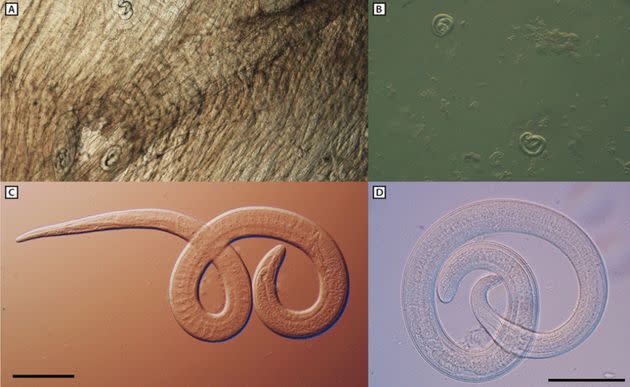Family Reunion Left 3 People Hospitalized With Rare Parasitic Worms, CDC Reports
A South Dakota family reunion where grilled bear meat was served ended with several people being diagnosed as having rare parasitic worms that infect muscle tissue and organs, including the brain, federal health officials revealed last week.
Six people were diagnosed with human trichinellosis, caused by a freeze-resistant roundworm, in July 2022 after eating meat that had been provided by one of the reunion guests who had been hunting in Canada, the U.S. Centers for Disease Control and Prevention said in a report released Thursday that urged safe handling and preparation of raw meat.
The meat was frozen for 45 days under the guidance of the hunting outfitter, who said freezing it would kill parasites. It was then made into kebabs and grilled alongside vegetables, but it was unintentionally served not fully cooked because the meat’s dark color made it difficult to tell if it was done, the CDC said.

“After some of the family members began eating the meat and noticed that it was undercooked, the meat was recooked before being served again,” the agency said.
A 29-year-old man who ate the meat later went to a hospital in Minnesota with a fever, severe muscle pain, swelling around his eyes and abnormalities in his blood tests. He sought care for his symptoms four times and was hospitalized twice over a 17-day period.
During his second hospitalization, his health care providers learned that he had eaten wild bear meat, and he was given treatment for the parasite before an antibody test confirmed his infection.
Of the six people showing symptoms, three were hospitalized with abdominal pain, muscle aches and pains, fever, diarrhea and swelling around the eyes. Two people who ate only the vegetables, which are believed to have been cross-contaminated by the meat, showed some signs of infection but did not have conclusive antibody testing, the CDC said.
Persons who consume meat from wild game animals should be aware that adequate cooking is the only reliable way to kill Trichinella parasites.the Centers for Disease Control and Prevention
“As demonstrated in this outbreak, the color of meat is not a good indicator of cooking adequacy,” the CDC said, and it recommended that game meat be cooked to an internal temperature of at least 165 degrees Fahrenheit in order to kill Trichinella larvae.
“Persons who consume meat from wild game animals should be aware that adequate cooking is the only reliable way to kill Trichinella parasites and that infected meat can cross-contaminate other foods,” the CDC said, while urging hunting professionals and overseers to educate hunters about the risks.
Human trichinellosis is far less common now because of changes in pork production practices that had once fostered transmission. From 2016 to 2022, there were only seven outbreaks in the U.S., with bear meat being the suspected or confirmed source of infection in the majority of those cases, the CDC said.
After ingestion, Trichinella nativa larvae invades the small intestine and then enters the blood stream. It travels to the skeletal muscles, cardiac muscle and brain, “which are high in oxygen content,” resulting in systemic symptoms such as fevers and organ inflammation, according to a previous report published on the National Library of Medicine’s website.
“In humans, the severity of infection is related to the number of larvae ingested,” the report states.
Brain worms were recently in the news when 2024 presidential contender Robert F. Kennedy Jr. said he suffered memory loss and mental fogginess in 2010 after a worm ate part of his brain.
Kennedy said the worm was found after a scan of his brain discovered a dark spot that was identified as a dead worm.
Kennedy told The New York Times he didn’t know what type of parasite it was or how he may have contracted it, though he suggested it could have been from a trip in South Asia. Several infectious disease experts and neurosurgeons, none of whom treated Kennedy, told the Times that, based on his description, it could have been a pork tapeworm larva.

